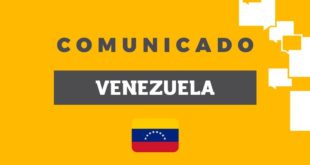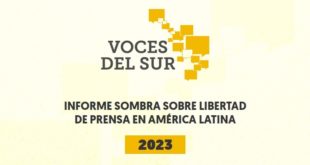El 2 de abril de 2013, la Comisión Nacional de Telecomunicaciones, ente ejecutivo encargado de regular el espectro radioeléctrico en Venezuela, inició un procedimiento administrativo contra Globovisión, planta televisiva privada con sede de Caracas, Distrito Capital. Esta averiguación se realiza por “la supuesta interferencia ocasionada a la alocución” en cadena de radio y televisión realizada por el Presidente encargado de la República Nicolás Maduro, encargado de la Presidencia, el 01 de abril.
Ricardo Antela, consultor jurídico de Globovisión informó en un reporte informativo del canal, que se presentó una falla técnica de audio “involuntaria” durante la transmisión de la cadena nacional que ofrecía Nicolás Maduro desde la Universidad Experimental de la Seguridad (UNES) -adscrita al Ministerio de Educación Universitaria y al Ministerio de Interior y Justicia. En este evento, el Presidente encargado -y candidato presidencial para los comicios del 14 de abril- anunció la creación del movimiento por la Paz y la Vida, que integrará a diferentes instancias del Estado para enfrentar la problemática de inseguridad ciudadana que afecta a los venezolanos.
Las alocuciones oficiales en cadena nacional, son de obligatoria transmisión según lo dispuesto en el artículo 10 de la Ley de Responsabilidad Social en Radio, TV y Medios Electrónicos (Resorte-me). Este lineamiento atenta contra los principios de la libertad de expresión, relacionados a la diversidad y pluralidad en la transmisión de los medios y la posibilidad de los ciudadanos a acceder de manera libre a los contenidos informativos.
Conatel indicó que durante 7 minutos el canal presentó problemas del audio de la cadena nacional. Este incidente, según el ente ejecutivo, podría considerarse como violatorio a la ley Resorte-me, debido a que se afectó la calidad original del audio de la alocución, la cual no “puede alterarse de forma alguna” ( http://htmlimg2.scribdassets.com/78pjj92l6o29xelj/images/2-5a4110244b.jpg).
Antela argumentó que el canal no incumplió la normativa y reiteró que no hubo intencionalidad. Explicó que minutos antes que iniciara la alocución de Maduro la planta televisiva había enviado una comunicación a Conatel informando sobre las fallas técnicas que habían detectad en la transmisión original de la señal de Venezolana de Televisión (VTV), principal medio audiovisual estatal.
Éste es el décimo procedimiento administrativo sancionatorio que inicia Conatel contra Globovisión. El 9 de enero de este año, Conatel abrió una averiguación contra la planta televisiva por, presuntamente, generar zozobra e incitar al “desconocimiento de las autoridades legítimamente constituidas, al presentar unos micros con interpretaciones del artículo 231 de la Constitución de la República Bolivariana de Venezuela, referente al acto juramentación y el inició de un nuevo período presidencial. Esta situación se enmarcó en el proceso de reposo postoperatorio que guardaba Hugo Chávez, Presidente de la República, para el entonces, quien fue reelecto en ese cargo en las elecciones del 7 de octubre de 2013. Hasta la fecha, el organismo no ha informado sobre las conclusiones de esta investigación.
También, en noviembre de 2011, Conatel aplicó una sanción administrativa a Globovisión, que comprendía una multa por la cobertura informativa del canal, durante la crisis penitenciaria presentada en la Cárcel de El Rodeo, en las adyacencias de Caracas, en junio de ese año.
Con estos precedentes, de aprobarse los cargos imputados en la averiguación contra el medio privado el órgano ejecutivo pudiese aplicar una “multa de hasta un 10% de los ingresos brutos causados en el ejercicio fiscal inmediatamente anterior a aquél en el cual se cometió la infracción, y/o suspensión hasta por setenta y dos horas continuas de sus transmisiones”. En el caso de que ente regulador considere que el medio reincidió en la infracción, pudiese revocar la “habilitación administrativa y concesión”, permisos otorgados para la operación de la planta televisiva, según el artículo 29 de la Ley de Responsabilidad Social en Radio, Televisión y Medios Electrónicos (http://www.conatel.gob.ve/files/GO39579-Ley%20RESORTE.pdf).
Etiqueta: acción administrativa
____________________________________________________________________________
Lea la versión en inglés
Tenth administrative investigation initiated against a private television station
On April 2, 2013, the National Telecommunications Commission, the executive entity in charge of regulating the radio-electric spectrum in Venezuela, initiated an administrative procedure against Globovisión, a private TV plant based in Caracas, capital district. This investigation was due to “the alleged interference in the allocution” on the radio and TV chain by the president in charge of the republic Nicolás Maduro on April 1st.
Ricardo Antela, the legal consultant of Globovisión informed during an info report, that an “involuntary” audio technical failure during the airing of the national chain offered by Nicolás Maduro from the Experimental Security University (UNES) -ascribed to the ministry of university education and the ministry of the interior and justice. At this event, the president in charge -and presidential candidate for the April 14 elections- announced the creation of the movement for Peace and Life, which shall integrate several state instances to face the problem of citizen insecurity which affects the Venezuelans.
The official allocutions through national chains are of compulsory airing as per article 10 of the Law on Responsibility on Radio, TV and Electronic Media (Resorte-me). This guideline attempts against the principles of freedom of expression related to the diversity and plurality in media transmissions and the possibility of the citizens to freely access information content.
Conatel indicated that for 7 minutes the TV channel presented audio problems during the national chain. This incident, according to the executive entity, could be deemed in breach of the Resorte-me law, since it affected the original quality of the allocution´s audio, which cannot “be altered in any shape or manner” ( http://htmlimg2.scribdassets.com/78pjj92l6o29xelj/images/2-5a4110244b.jpg).
Antela argued that the channel did not breach the norms and reiterated that there was no intentionality. He explained that minutes prior to the start of Maduro´s allocution the TV plant had sent a communication to Conatel informing on the technical flaws detected in the original transmission in the signal of Venezolana de Televisión (VTV), the state´s main audiovisual media.
This is the tenth sanction-based administrative procedure initiated by Conatel against Globovisión. On January 9th of this year, Conatel filed an investigation against the TV plant for allegedly generate gloom and doom and inciting towards “disowning the legitimately constituted authorities, in presenting micros disclosing interpretations of article 231 of the constitution of the Bolivarian republic of Venezuela, regarding the swearing in and start of a new presidential period, within the framework of the post-op recovery period of Hugo Chávez, the president of the republic, at the time, who was re-elected in the October 7, 2012 elections. To date, the entity has not informed on the conclusions of this investigation.
Also in November 2011, Conatel applied an administrative sanction against Globovisión, including a fine on the channel´s information coverage during the penitentiary crisis in June of that year in the El Rodeo jail, in the adjacencies of Caracas.
With these precedents, if the charges imputed in the investigation against the private media are approved the executive entity could levy a “fine of up to 10% of gross revenues during the immediate previous tax year to the infraction, and/or the suspension for up to seventy-two continuous transmission hours”. If the regulatory entity considers that the media relapsed in the infraction, it could revoke the “administrative permit and concession”, permits granted to operate the TV plant as per article 29 of the Law on Responsibility in Radio, TV and Electronic Media (http://www.conatel.gob.ve/files/GO39579-Ley%20RESORTE.pdf).
Label: administrative action
 IPYS Instituto Prensa y Sociedad Venezuela
IPYS Instituto Prensa y Sociedad Venezuela



